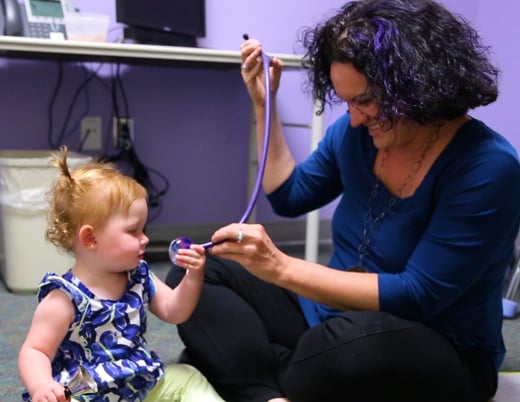Body hair. Weight gain. Severe acne. If that sounds distilled from the nightmares of teenage girls, it might be. It also describes the symptoms of polycystic ovary syndrome (PCOS), a condition that affects about 10-15% of teenage girls.
"Being a teenager in this society is hard regardless," says Melanie Cree Green, MD, PhD, pediatric endocrinologist and Director of the Polycystic Ovary Syndrome Clinic at Children's Hospital Colorado. "For these girls, it's incredibly difficult."
The PCOS Clinic at Children's Colorado
One of the first and only clinics of its kind in the nation, the PCOS Clinic is geared specifically toward helping combat the day-to-day difficulties and adverse effects of this non-life-threatening but seriously life-impacting syndrome. It grew out of Children's Colorado's Lifestyle Medicine Clinic, which brings together dietitians, psychologists, exercise physiologists, and others to help with weight management in kids and teens.
Adding endocrinologists, gynecologists and dermatologists to the mix, Dr. Cree Green's model is equipped to research and treat every aspect of the disease, from acne to a heightened risk of type 2 diabetes.
Addressing a health concern for women
"Our first study enrolled 75 girls and looked at type 2 diabetes risk and fatty liver disease in girls with PCOS," says Dr. Cree Green. "We found that 45% had fatty liver disease, as well as signs of early heart disease."
That's cause for concern. Fatty liver disease is on its way to becoming the number-one cause of liver transplants in the U.S., says Dr. Cree Green.
Compounding the problem is that there's currently no medication to treat the underlying causes of the disease. There's not even a therapy to reliably treat the symptoms. Over time, Dr. Cree Green hopes to study data will help identify new treatments and drugs to target the disease at its roots.
Personalized treatment and support for girls with PCOS
Until then, the clinic offers girls with PCOS highly individualized treatment and, perhaps more importantly, a system of much-needed support. Through monthly groups and classes, girls can learn strategies for dealing with PCOS not just from healthcare providers, but from each other — making life, for now, just a little less difficult.
Featured Researchers
Melanie Cree, MD, PhD
Director, Multi-Disciplinary PCOS clinic
Department of Pediatric Endocrinology
Children's Hospital Colorado
Associate professor
Pediatrics-Endocrinology
University of Colorado School of Medicine





 720-777-0123
720-777-0123










